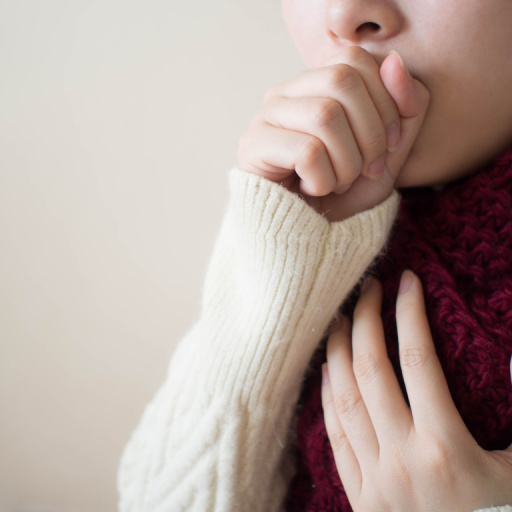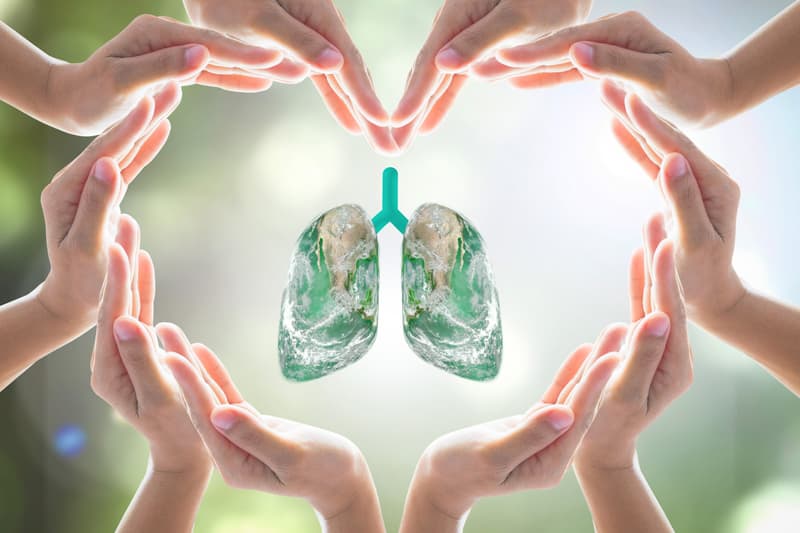Bronchitis is a common respiratory chronic condition caused by many irritants, such as pollution, tobacco, virus, bacteria, allergies, or dust, that aggravate the bronchial tubes, causing inflammation. These tubes carry out the function of carrying air into the lungs from the mouth and nose. The swelling narrows the airways causing a cough and may make breathing difficult. The irritation may also lead to increased mucus production, which blocks the airways.
What you need to know:
- Does allergic bronchitis spread?
- Factors of allergic bronchitis
- When to consult a doctor?
- Bronchitis home treatments
Does allergic bronchitis spread?
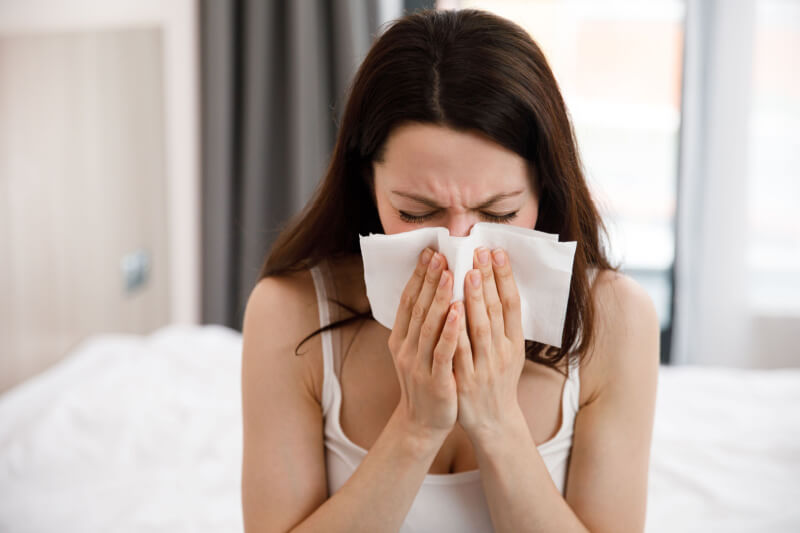
There are two types of bronchitis: acute bronchitis caused by a virus and chronic bronchitis caused by chronic lung disease. You may wonder – is bronchitis contagious? A bronchitis virus can be transmitted from person to person through infected droplets emitted through a cough or sneeze. In many cases of acute bronchitis, a cough can persist for several weeks, even after the infection is gone.
Factors of allergic bronchitis
Some symptoms of allergic bronchitis are fatigue, tightness in the chest, fever, heart burns, mucus-producing cough, sore throat, and wheezing. Complications of bronchitis can also lead to lung infections or pneumonia. The common causes of allergic bronchitis include being exposed to air pollution, chemical fumes, engine exhaust, dust, pollen, cigarette smoking, and secondhand smoking. Smoke is filled with dangerous chemicals, which irritate the airway lining and produce extra mucus.
When to consult a doctor?
Bronchitis can be categorized as allergic, non-allergic, or asthmatic, depending upon the irritants and causes. Allergic bronchitis that lasts for months or even longer is called chronic bronchitis. This is when you should consult a doctor if a cough persists for a long time. Chronic bronchitis is a type of chronic obstructive pulmonary disease (COPD), along with emphysema (a lung condition that causes shortness of breath).
After evaluating the symptoms, an experienced pulmonary doctor may suggest some tests for bronchitis diagnosis that include:
- Chest X-ray to check the cause of the persistent cough and to determine if a person is suffering from pneumonia or any other condition.
- In a pulmonary function test, patients are asked to blow into a device known as a spirometer. It measures the amount of air that can be held in your lungs. The test primarily determines asthma or emphysema.
- Sputum is the mucus that is coughed out of the lungs. Sputum tests check if you have any antibiotic-induced illnesses or any signs of allergies.
Here are some treatments for the symptoms of allergic bronchitis:
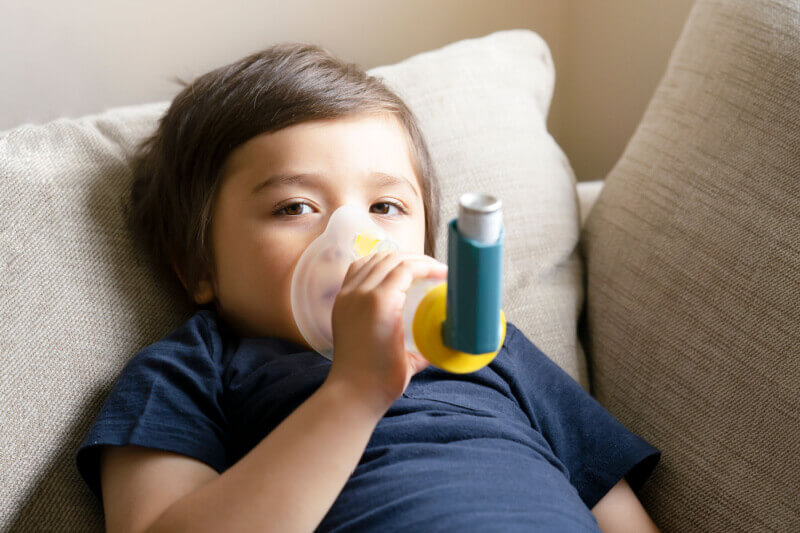
- Bronchodilators are medications that relax the muscles around the airways. As a result, the airways dilate or widen, making breathing easier. Both short-acting and long-acting bronchodilators are available. While the former quickly resolves the symptoms, the effects do not last very long. The latter does not act quickly; however, the effects are long-lasting. Individuals can take bronchodilators through a metered dose inhaler.
- Steroids are used to treat allergic bronchitis as they reduce bronchial tube inflammation. Therefore, it reduces coughing and eases airflow. Despite steroids being an intravenous or oral medication, a physician will administer them through an inhaler in case of bronchitis.
- People with severe allergic bronchitis can have decreased oxygen levels in the blood as this chronic condition interferes with the oxygen flow into and out of the lungs. In this case, the doctor may prescribe oxygen therapy to restore oxygen levels to normal.
- Individuals can take a mucolytic drug either orally or through a nebulizer (a device that changes liquid medication into an aerosol. This medication makes mucus thinner and less sticky, making it easier to expel mucus from the lungs while coughing.
- Pulmonary rehabilitation classes include supervised breathing exercises. These classes spread awareness of ways to decrease exposure to allergens that may trigger symptoms of allergic bronchitis.
Bronchitis home treatments
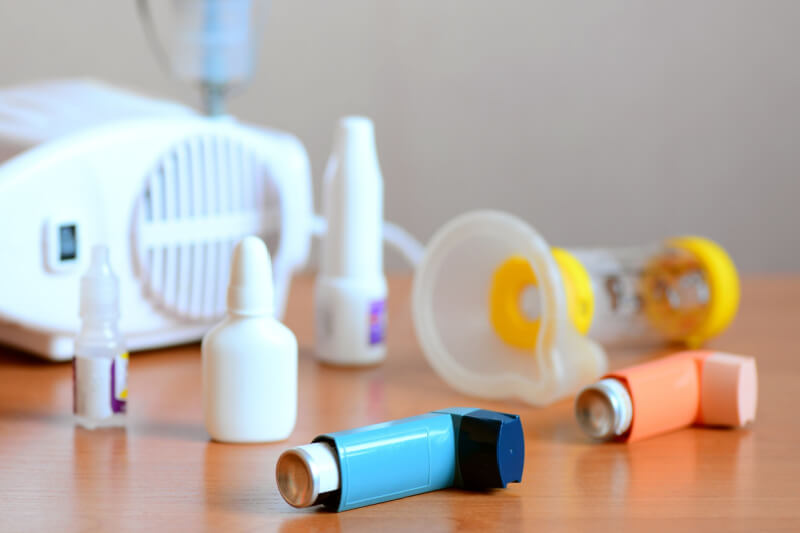
Treating this condition is more complicated and requires essential lifestyle changes. Take a look at the steps people can take at home to lessen the effects of allergic bronchitis:
- Some nutritional benefits can go a long way in preventing respiratory infections. Consuming ginger in the raw form or adding it to tea can have an anti-inflammatory effect against respiratory infections. Turmeric contains curcumin, which has anti-inflammatory, anti-bacterial, and anti-viral properties that can boost immunity.
- Inhaling steam helps break up mucus and causes it to expel easily. The hot water also helps the muscles relax from being tense while coughing.
- A humidifier moistens the air, which can loosen mucus and make it easier to expel.
- Drink plenty of water to help keep mucus thin.
- Allergic bronchitis can also cause a sore throat. Therefore, gargling with salt water eases any discomfort.
- Quit smoking and avoid secondhand smoke to improve your lung health and strengthen your immune system.
- Get plenty of rest.
- Consume a healthy diet rich in nutrients and minerals.
- Thoroughly wash your hands, especially before and after eating. Avoid touching your eyes, mouth, and nose with unwashed hands.
- Ensure you get the flu and pneumonia vaccines.
- Exercise daily to improve the functioning of your lungs. Yoga for bronchitis also goes a long way in strengthening your lung capacity.
- Wear a mask that covers your mouth and nose to decrease airway inflammation and reduce exposure to irritants that can trigger allergic bronchitis.
- Avoid triggers, such as pets, pollen, and dust, if you have allergies or asthma.
Stay active in the Activ Living Community to find more details on mindfulness and nutrition.
Popular Searches
How to lower blood pressure | Fruits good for liver | Unhealthy foods | Ragi Benefits | Basal Metabolic Rate | Acupressure points for High Blood Pressure | Ayurvedic medicine for blood pressure | How to control cholesterol at home | Homeopathy for Asthma | Biological Age | Home remedies for TB | Natural beta blockers | Negative effects of internet | Types of walking | Blood pressure calculator | Blood sugar calculator | BMI Calculator





 1800-270-7000
1800-270-7000


